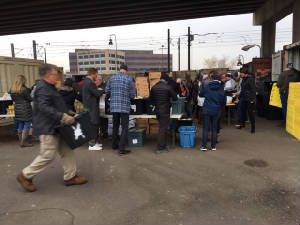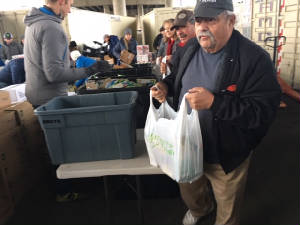UPDATED: June 30, 2024


Above: Bob Bell and Terry Frei at two of Food For
Thought's Rock-A-Belly festival fundraisers in recent years. Left: At the Auraria Higher Education Center. Bottom: At The
Rose in Golden.
On
a Friday in December 2011, Realtor Bob Bell was seated at the bar, next to the front door at My Brother's Bar. Open since
1873, it's the oldest saloon in Denver and is a few steps from the South Platte, adjacent to downtown. Bell and his buddies
were among the many regulars. If they didn't know your name when you walked in, they often did when you left.
As indefatigable barkeep Jimmy Hayde, one of Bell's best friends, served up drinks and banter, Bell found himself talking with Tracy Towle, a special education
teacher at Columbian Elementary in North Denver. Bell was raised in the area and graduated from Holy Family
High School, long before it moved from North Denver to Broomfield.
"Tracy just got talking, telling me about the school and the kids and how
they don't eat on the weekends," Bell recently told me over lunch.
Bell was startled. He remembers thinking, "What the hell?"
"I drove by that school every day, and I didn't know any of that," Bell
said. "Tracy told me to come by there the next Monday. So I did."
At Columbian, he was given a tour and spoke with Towle and others. He was told that many of
the kids indeed hadn't eaten since the previous Friday, and that it added to the challenges of both teaching and learning.
He also was told that 95 percent of the students qualified for free or reduced-price school lunches, so that wasn't the problem.
The problem was the weekends. Many Columbian
students were from single-parent households, or they were living with their grandparents or with other family. Regardless
of the specifics, though, a common thread was that many went hungry over the weekends and struggled to concentrate when returning
to class on Monday mornings.
Back at My Brother's Bar that
day, Bell told his friends and Hayde what he had heard and seen at Columbian. They started batting around ideas about what
could be done, both at that school and elsewhere.
"We said, 'How hard can it
be?'" Bell said. "Well, it wasn't."
The seeds of Food For Thought had been planted.
"The very first thing
Tracy told me was, 'Don't start this if you guys are just going to fizzle out on us,'" Bell said. "She said, 'These
kids are promised the world and nothing happens. Don't let them down.'"
That hasn't happened.
Nearly 13 years after that conversation, Food For
Thought, the remarkable Bell-led, all-volunteer organization,
still delivers PowerSacks of food to Denver-area schools every Friday afternoon during the academic year. The goal is to get
the students nutritionally through the weekends, filling the two-day void. The program has spread from two schools at the outset to 75 at last count. A vast majority of the schools involved are elementaries, but Food For
Thought also provides well-stocked pantries at eight area high schools and works with a few middle schools, prep schools and
academies; plus even Metropolitan State University of Denver.
Early (very early) on Friday mornings during the school year, Food for Thought volunteers gather under the Colfax
viaduct downtown, across the street from MSU Denver's Roadrunner Athletic Complex at the edge of the Auraria Higher
Education Center. Using the non-perishable items that Food for Thought purchases for a stunningly bargain price from the Food
Bank of the Rockies, the early-rising volunteers put together the PowerSacks for Denver-area students. They're loaded onto
trucks and delivered to the schools by 3 p.m. each Friday, and the students take them home.
Bell's
Arvada Rotary Club provided the first $30,000 in funding, and it went from there. In 2024, Food For Thought raises money through
a wide range of sponsorships, including from the corporate sector. Also, supporters can donate $5 to pay for one PowerSack
or $5,000 to fund the program for one class for a school year. Executive board members and others underwrite Food For Thought's expenses. An annual Rock-A-Belly festival is both a $100-per-ticket
fundraiser and a means to thank supporters.
Food For Thought's strategy has been simple from
the start. All kids at the schools involved in the program get Power Sacks on Fridays. Food For Thought doesn't attempt to
determine individual need. A total of 55,000 Denver-area students receive free or reduced-price cost lunches during the week,
though, so widespread distribution of the PowerSacks for the weekends is a sensible additional step of support.
"When we decided to do it, we never
wanted to put a kid in a situation where we would select which kids were the hungriest," Bell said. "The first school
we went to was 95 percent free or reduced lunch. Everybody in there -- or, well, 95 percent -- came from an average income
below $30,000 for a family of four. We said let's just feed the kids. If one kid doesn't need a bag, he knows who could use
it. That's the model we've sustained , even through today. We don't try to find a kid to tell, 'Because your life sucks the
worst, you wait over there.'"
The first distributions were to Columbian
and Fairview Elementary on St. Patrick's Day in 2012. (Sadly, Fairview closed its doors in 2013.) The number of schools involved
was stable in the first few years, remaining as low as two in 2015-16 before jumping to 23 by 2016-17. The growth has continued
to the current 75 receing aid from Food For Thought.
"We didn't pick any of them," Bell said of the schools in the program.
"They've all picked us, ever since that first day. Once the word got out, another school would say, 'What about us?'
Now we can go to our friends and say we can add this school, but we need some dough and that 20 grand will do a school for
a year. It might be 30 grand, depending on the size off the school. Actually, I've stopped counting the schools. I count the bags. We're giving out 36,000
bags a month. The only thing we pay for is the food, and that's $1.2 million in a year."
The distribution has spread from
Denver to schools in Westminster, Adams County, Commerce City, Aurora, Sheridan, Boulder and Lafayette. Also, Food For Thought
in recent years added a second distribution hub in northeast Denver, using warehouse space donated by supporter Don Rainville,
who also pays for Food For Thought's considerable trucking costs.
"He said he had the warehouse and he'd carve
out some space for us for Fridays," Bell said. "He just tossed me the key and said, 'I trust you for what you want
to do, whatever you need, I'll support.' And here's the guy who underwrites all of our trucking expenses. We contract with
the trucking companies and he pays for it. Can you believe it? This whole journey has been equally fascinating. It's how people
are. People are good. They just want a way to do it."
Food For Thought's PowerSacks
generally contain 10 to 15 items, often including peanut butter and jelly sandwiches, granola bars, fruit cups and Rahmen
noodles. It's designed to be enough for two weekend meals for not just the one student, but for a family of four. The Food
Bank of the Rockies is adept at working the system to obtain the food, and Bell estimates that if Food For Thought had to
line up the food for the sacks from conventional distributors, the cost would be at least $8 per bag.
"We don't buy from anywhere else," Bell said. "We have only one supplier. They're angels out there.
We might be their number one agency now. In
reality, we're just trying to get them as much as we can get them in that bag. Our budget is self-imposed. The women who do
our buying for us know what we have to work with. But you'd be amazed by what we can get in the bag for five bucks."
Volunteers
don't just pack the PowerSacks. Many are involved in picking up and loading the food, plus transporting it to the distribution
sites and placing it on tables to be loaded into the bags. Also, they deliver to the schools.
Work and
distribution even continued to the extent possible through the pandemic.
"We said, 'Let's try this,'"
Bell said. "'We'll go down on Friday morning to pack the bags and if nobody is there, we'll know.' That was March
20 of 2020 and everybody was there. They'd already closed the schools, which for most of these kids was their home. It's where
somebody says, 'We love you, come in here, it's warm, here's some breakfast, here's a place you can crash if you have to crash.'
The DPS offices called and said, 'We're going to be opening 83 sites across the city schools and we're going to put a cafeteria-type
room in there. There will be breakfast and we would like your bags there for them to take home.' We followed the same model. I can't tell you in good conscience that it worked
because I don't know how those kids got the bags. Somehow they did. We didn't get any bags back."
Food For Thought will plow on, with Bell -- the North Denver native who also graduated from Colorado State
and is the long-time owner of Mile Hi Property-- continuing as the energetic leader.
"I'm just fortunate that
my schedule, with being a Realtor, I can work when I want to," Bell
said. "I can take a half day off on Friday. I work weekends, and that's not a problem. My clients get it. If I had an
8-to-5 job, this never would have happened."
Like the schools, Food
For Thought also is on summer break. It'll be back in the new school year. And to think it got started at two barstools.
Food for Thought's web site
PO Box 11813
Denver CO 80211
Contact: Bob Bell, 720-201-9192

Bob Bell near Food
For Thought's PowerSacks assembly site beneath the Colfax viaduct.


Food For Thought volunteers assembling the PowerSacks.








